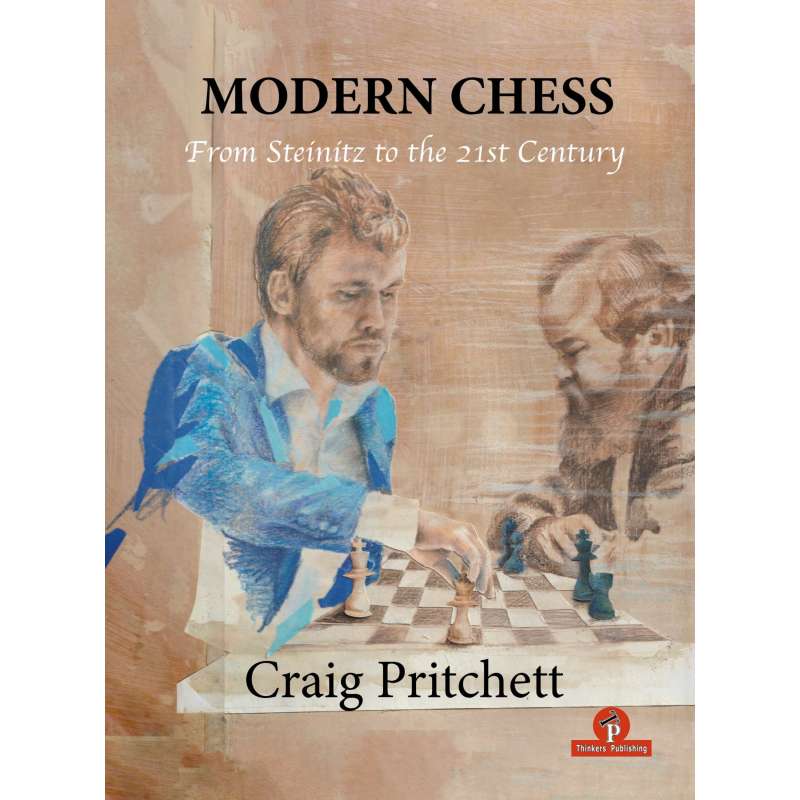Power Fritz 18 - polska wersja językowa (P-0103)
NOWOŚĆ 2022! POLSKA WERSJA JĘZYKOWA (INTERFEJS W JĘZYKU POLSKIM)
NOWA, ULEPSZONA WERSJA PROGRAMU FRITZ 18 WZBOGACONA O SILNIK POWERFRITZ ORAZ BAZĘ FRITZ POWERBOOK 2022!!
NOWOŚĆ 2022! POLSKA WERSJA JĘZYKOWA (INTERFEJS W JĘZYKU POLSKIM)
NOWA, ULEPSZONA WERSJA PROGRAMU FRITZ 18 WZBOGACONA O SILNIK POWERFRITZ ORAZ BAZĘ FRITZ POWERBOOK 2022!!
Uwaga: bierki warcabowe nie są magnetyczne.
Nowy silnik Fritz 19 już dostępny!
Atakujący, tchórz, oszust lub czarodziej końcówek: Pokażę ci, jak wygrać z każdym! Po moich zwycięstwach w mistrzostwach świata w 2022 i 2023 roku, jestem panującym mistrzem świata oprogramowania szachowego i nie mogę się doczekać, aby pokazać ci, jak stać się jeszcze silniejszym przeciwko przeciwnikowi
Najlepiej sprzedające się szachy od lat.
Najlepszy stosunek jakości do ceny.
Szachownica i figury wykonane z drewna.
SZACHOWNICA wypalana, składana na pół,
w środku znajduje się wkładka na figury szachowe
FIGURY drewniane, wypalane, podklejane zielonym filcem
Wymiary szachownicy: 54 x 54 x 3 cm
Wymiar pola: 55 x 55 mm
Król: 110 mm
Waga 2.50 kg
1400 Kombinacji matowych - Ryszard Czajkowski, Andrzej Nowicki
----------------------------------------------------------------------------
Niniejsza książka to unikalny zbiór 1400 diagramów z praktyki szachowej mistrzów i arcymistrzów z wielu krajów i różnych epok oraz własnych przykładów samych autorów.
Stopień trudności poszczególnych zadań jest na tyle zróżnicowany, by każdy szachista czerpał radość z ich rozwiązywania, niezależnie od swoich umiejętności. Tak więc w książce znajdziemy proste i bardziej skomplikowane przykłady taktyki szachowej, klasyczne końcówki, piękne kombinacje, które na zawsze przeszły do historii szachów, studia, etiudy i kompozycje szachowe oraz odzwierciedlenie zawartych w nich idei przeniesionych do praktyki turniejowej.
Czytelnik może poznać różnorodne sposoby matowania – od najprostszych jedno i dwuposunięciowych do mata w 262 (!!) posunięciach.
SZACHY TURNIEJOWE w kolorze WENGE NR. 5
Klasyczny, profesjonalny zestaw turniejowy w rozmiarze nr 5 (48x48 cm)
Ciemny kolor zestawu sprawia, że szachy prezentują się bardzo oryginalnie.
Produkt dostępny wyłącznie w formie pobrania
Nowe książeczki ChessBase zawierają kod aktywacyjny, który umożliwia pobranie produktu. ChessBase 18 oraz nowe bazy danych nie będą już wydawane na DVD-ROM. Szczegóły na końcu opisu.
ChessBase to samodzielna baza danych szachowych, która stała się światowym standardem. Korzystają z niej wszyscy – od mistrzów świata po amatorów. Jest to ulubiony program każdego miłośnika szachów, który chce poszerzyć swoją wiedzę i umiejętności. Rozpocznij swoją osobistą przygodę z sukcesami dzięki ChessBase i ciesz się grą jeszcze bardziej.
„Mistrzowie Polski w szachach” to oryginalna pozycja na rynku literatury szachowej dotyka bowiem tematyki nie do końca precyzyjnie opracowanej przez innych autorów, tj. naszych rodzimych, polskich szachistów.
Autor przygotował materiał, który zawiera propozycje gry wariantów przeciwko debiutom otwartym i półotwartym. Każdemu debiutowi autor poświęcił tyle miejsca, na ile zasługuje ze względu na bogactwo wariantów i częstość jego występowania w praktyce turniejowej.
Kompletna edycja książek z serii WESOŁE SZACHY wydana w jednym podręczniku.
Ten kompleksowy podręcznik dla najmłodszych szachistów zawiera nie tylko wszystkie 3 części "Wesołych Szachów, ale także część 4 - czyli całkowitą nowość, dotychczas nigdy nie wydaną!
Piękny, nowoczesny plecak w uniwersalnym - szarym kolorze z motywem figur szachowych.
Idealny na zajęcia szkolne, krótkie wyjazdy lub treningi, ale także jako codzienny element garderoby.
SZACHY TURNIEJOWE NR 5 - CZEREŚNIOWE
Drewniane figury Staunton nr 5 z drewna czereśniowego - obciążone, podklejone zielonym filcem
- Wysokość króla - ok. 90 mm;
- Wysokość pionka - ok. 45 mm
Szachownica drewniana, składana na pół z miejscem na figury w środku.
- Wymiar szachownicy: 48 x 48 x 2,7 cm;
- Wymiar pola szachowego: 48 x 48 mm;
Waga łączna: 1.7 kg;
Szachy drewniane turniejowe w rozmiarze idealnie dopasowanym do dzieci w wieku 6-10 lat !!
Figury szachowe - drewniane, wykonane w klasycznym kształcie.
Zastosowany rozmiar figur to idealne rozwiązanie dla dzieci, które zaczynają swoją przygodę z królewską grą.
Szachownica - klasyczna składana na pół szachownica w formie zamykanej kasetki, wewnątrz której znajdziemy miejsce na figury.
Dzięki temu, że szachownica jest składana i można w niej przechowywać figury, zestaw jest prosty w użyciu i transporcie.
Szachy idealnie sprawdzą się jako narzędzie treningowe, które można mieć właściwie zawsze przy sobie.
Drewno: Grab, Buk, Akacja
Waga zestawu: ok.1 kg
WYPRODUKOWANE W POLSCE!
Najniższa cena w ciągu 30 dni przed aktualną promocją: 36,9 zł
Podręcznik kombinacji szachowych dr. Tarrasha to unikalna pozycja, która powstała w oparciu o fragment pracy
Siegberta Tarasha - „Gra w szachy” traktujący o kombinacjach.
W przeciwieństwie do innych dostępnych na rynku pozycji o kombinacjach jest nie tylko ich zbiorem,
ale także opisuje mechanizmy kombinacji oraz wyjaśnia je. Dzięki temu staje się niepowtarzalna i przydatna na każdym etapie rozwoju.
Książka jest przeznaczona dla szachistów od V do II kategorii, chociaż niektóre jej fragmenty przydadzą się także szachistom I kategorii.
SPIS TREŚCI:
005 Przedmowa
007 Wstęp
011 Rozdział 1. Podwójne uderzenie
027 Rozdział 2. Związanie
045 Rozdział 3. Atak z odsłony
051 Rozdział 4. Nie broniona figura
055 Rozdział 5. Usunięcie obrony
060 Rozdział 6. Pozorna obrona
064 Rozdział 7. Zamykanie gońca
066 Rozdział 8. Łapanie hetmana po wzięciu na b2 (b7)
068 Rozdział 9. Atak na punkt f7 (f2)
070 Rozdział 10. Atak pionem „f”
072 Rozdział 11. Odsłonięcie pozycji króla
076 Rozdział 12. Rozbita pionowa pozycja roszady
080 Rozdział 13. Gdy pion h3 (h6) jest obiektem ataku
083 Rozdział 14. Atak po linii „f"
087 Rozdział 15. Atak po linii „g” (lub „b”)
094 Rozdział 16. Atak po linii „h” (lub „a”)
105 Rozdział 17. Dwa gońce przeciw pozycji roszady
107 Rozdział 18. Niebezpieczeństwa związane z długą roszadą
108 Rozdział 19. Mat Beniowskiego
111 Rozdział 20. Mat na 1. (8) linii
118 Rozdział 21. Wieczny szach
119 Rozdział 22. Wieża na otwartej linii pionowej i na 2.(7) linii
129 Rozdział 23. Działanie liniowych figur przez nieprzyjacielskie figury
131 Rozdział 24. Wolny pion
139 Rozdział 25. Daleko wysunięte piony
143 Rozdział 26. Gdy pion c6 (c3) jest obiektem ataku
145 Rozdział 27. Gdy pion b6 (b3)
149 Rozdział 28. Trochę rad
Szachy drewniane, składane ze specjalna kasetką na figury.
Figury turniejowe Staunton nr 5, obciążone, podklejane filcem.
Szachownica intarsjowana naturalny mahoń
Wymiar szachownicy: 47 x 47 x 2,5 cm;
Wymiar pola szachowego: 48 x 48 mm;
Wysokość króla: 93 mm; pionek: 4,5 cm;
Waga łączna: 2,00 kg;
Figury szachowe STAUNTON 6 w kasetce drewnianej + deska drewniana nr6
Figury szachowe turniejowe, drewniane, obciążane, podklejane filcem, wkładane do kasetki drewnianej
Wysokość króla 98mmm.
Deska drewniana, intarsjowana
Wymiary: 55x55x2cm
Wymiary pola: 56 x 56 mm
Waga łączna 4,00 kg
Kompletny zestaw dwóch części książki Mistrzowie Polski w Szachach obejmujący biografie polskich szachistów grających w latach 1926 - 2021r.
Notes do zapisu 100 partii + miejsce na analizę i diagramy. 200 stron!
Wymiary: 21 x 15 cm.
Okładka nawiązuje swoim stylem graficznym do naszej podkładki pod myszkę!
Kup w zestawie!
Nie możesz się zdecydować co podarować bliskiej Ci osobie na prezent? Szachy? A może lepiej warcaby?
A może sam chciałbyś mieć w domu jedno i drugie?
Dzięki niniejszemu zestawowi 2 w 1 masz możliwość cieszyć się obiema grami.
W drewnianej, składanej na pół, "wypalanej" szachownicy znajdziesz zarówno figury szachowe jak i bierki warcabowe.
Wymiary szachownicy po rozłożeniu: 35x35 cm
Wymiary szachownicy po złożeniu: 35x17,5cm
Wymiary pola 3x3 cm
Wysokość króla: 65 mm
Zestaw jest nie tylko przydatny i uniwersalny ale także bardzo poręczny.
UWAGA! Pionki warcabowe nie są podklejone filcem.
Czapka zimowa z szachowymi motywami.
Piękna, ciepła czapka zimowa z przyjemnego w dotyku materiału, wyszyta wewnątrz polarem to wspaniały prezent na Mikołajki lub inną okazję, ale także świetne uzupełnienie dziecięcej (i nie tylko garderoby). To niebanalny dodatek, który przełamie i rozweseli każdą stylizację.
Wymiary:
Szerokość: 25 cm (obwód 50 cm)
Głębokość: 20 cm
‘I as though traced the evolution of chess thought and repeated its basic steps in my own development … convinced that any player with high ambition should follow such a path’ ~ Vassily Smyslov, 125 Selected Games (1983)
This book takes the reader on a journey from early 19th century developments in the game up to the present-day. It takes in the revolutionary Wilhelm Steinitz’s early summation and establishment of a firm positional basis for chess and the considerable contributions made by all of the subsequent world champions and certain other great players, including the contemporary computer phenomenon, AlphaZero.

Gwarancja zwrotu pieniędzy

Bezpieczne i szybkie dostawy

Bezpieczeństwo transakcji dzięki certyfikatowi SSL
‘I as though traced the evolution of chess thought and repeated its basic steps in my own development … convinced that any player with high ambition should follow such a path’ ~ Vassily Smyslov, 125 Selected Games (1983)
This book takes the reader on a journey from early 19th century developments in the game up to the present-day. It takes in the revolutionary Wilhelm Steinitz’s early summation and establishment of a firm positional basis for chess and the considerable contributions made by all of the subsequent world champions and certain other great players, including the contemporary computer phenomenon, AlphaZero.
Take note of Vassily Smyslov’s wise words. Recalling a period of intense study in his father’s chess library, Smyslov stressed that, without obtaining an understanding of the ways in which chess has developed over time, no aspiring player is ever likely to achieve his or her fullest potential. What went for Smyslov also applies to all of the inspirational players who appear in this book. Today’s top players still borrow from the best games and ideas of past generations. Do join them!
I wrote this book primarily to explore, confirm and convey my own understanding of this grand sweep of chess history. To that extent it can only be a subjective work and readers may hold other opinions. Though I hope that much in this book is, indeed, persuasive, please feel free to reflect and draw your own conclusions. I also aimed at containing my account in one accessible volume, inspired by such succinct chess classics, as Richard Réti’s, Masters of the Chessboard, Max Euwe’s, The Development of Chess Style, and others.
We are all historically rooted, inescapably driven to constantly re-interpret the past to help make sense of our present and possible future. Indeed, the past often touches us when least expected. My working copy of Imre König’s fine book, Chess From Morphy to Botwinnik, on loan from the Edinburgh Chess Club’s ‘Aitken’ collection, is warmly inscribed by the author to his friend, Dr James M Aitken (1908-83), ten times Scottish chess champion.
That unexpected, near 70 year link to the middle age of one of my own illustrious countrymen, who, towards the very end of his chess career, was one of my own Scottish team colleagues, at the 1972 Skopje Olympiad, greatly encouraged me to pursue this project. Rarely, if ever, truly definitive, history moves on ceaselessly. The game itself changes. The context varies. Do enjoy the continuing journey!
Craig Pritchett
Dunbar, September 2021
011 Introduction
013 From the Romantics to the Early Modern Age
061 Resolving Classical Tensions
109 Hypermodern Ideas and the Maturing Mainstream
155 Soviet Dymanics
207 Professional Sport in a New Information Age
259 Mastery in the Modern Computer Age
315 Acknowledgements
316 Bibliography
322 About the Author
Opis
Szczegóły produktu
Chess Secrets is a series of books which uncover the mysteries of the most important aspects of chess, such as strategy, attack, defence, opening play, endgames, off-board preparation and mental attitude. In each book the author chooses and deeply studies a number of great players who have excelled in such aspects of the game, greatly influenced their peers and inspired all of us.
A winning streak in chess, says Cyrus Lakdawala, is a lot more than just the sum of its games. In this book he examines what it means when everything clicks, when champions become unstoppable and demolish opponents. What does it mean to be ‘in the zone’? What causes these sweeps, what sparks them and what keeps them going? And why did they come to an end?
Lakdawala takes you on a trip through chess history looking at peak performances of some of the greatest players who ever lived: Morphy, Steinitz, Pillsbury, Lasker, Capablanca, Alekhine, Botvinnik, Fischer, Tal, Kasparov, Karpov, Caruana and Carlsen. They all had very different playing styles, yet at a certain point in their rich careers they all entered the zone and simply wiped out the best players in the world.
In the Zone explains the games of the greatest players during their greatest triumphs. As you study and enjoy these immortal performances you will improve your ability to overpower your opponents. You will understand how great moves originate and you will be inspired to become more productive and creative. In the Zone may bring you closer to that special place yourself: the zone.
Cyrus Lakdawala is an International Master and a former American Open Champion. He has been teaching chess for four decades and is a prolific and widely read author. His Chess for Hawks won the Best Instructional Book Award of the Chess Journalists of America (CJA). Other much acclaimed books of his are How Ulf Beats Black, Clinch It! and Winning Ugly in Chess.
Таль Михаил Нехемьевич (9.11.1936—28.06.1992) восьмой чемпион мира (1960—1961), международный гроссмейстер (1957). Чемпион Латвии 1953, 1965 гг. Чемпион СССР 1957, 1958, 1967, 1972, 1974, 1978 гг.
Фабиано Каруана - один из сильнейших шахматистов современности, участник матча за звание чемпиона мира. В своей книге гроссмейстер Сайрус Лакдавала изучает в деталях шахматный стиль Каруаны на примере его лучших, включая 2020 год, партий.
BRAK NA MAGAZYNIE - produkt może zostać sprowadzony "NA ZAMÓWIENIE"
Автор книги — выдающийся немецкий гроссмейстер, претендент на титул чемпиона мира и шахматный литератор. В книге представлены два сборника, включающие шахматные партии с подробными комментариями автора, сыгранные на турнирах в Остенде (1907) и Санкт-Петербурге (1914). В них играли сильнейшие шахматисты тех лет — каждый был чемпионом своей страны. Среди участников: З. Тарраш, К. Шлехтер, Д. Яновский, А. Рубинштейн, М. Чигорин и мн.др. Отсюда и название — «Турниры чемпионов». Особое значение этим шахматным ристалищам придает участие чемпиона мира Э. Ласкера и двух будущих чемпионов — Х.Р. Капабланки и А. Алехина. Для широкого круга любителей шахмат
Judit Polgar is the strongest female chess player of all time. From an early age on the Hungarian prodigy baffled the world with her sensational triumphs. At the age of 15 she beat Bobby Fischer’s record to become the youngest grandmaster in history. During her glorious career, which she ended in 2014, she defeated World Champions Boris Spassky, Anatoly Karpov, Garry Kasparov, Vishy Anand and Magnus Carlsen.
В своей новой книге гроссмейстер Зенон Франко глубоко анализирует 30 поучительных побед Яна Непомнящего и большое число фрагментов, в том числе из турнира претендентов (Екатеринбург 2020-2021). Книга не перегружена вариантами, акцент – на подробных объяснениях в формате «ход за ходом», что создает идеальную платформу для изучения шахмат. В «опорных» точках каждой партии читателю предлагаются тестовые вопросы, что помогает и практическому изучению ключевых приемов шахматной игры, и надежному усвоению обретаемых знаний. Вопросы и ответы вовлекают читателя в процесс обучения и помогают ему отслеживать рост своей шахматной силы.
The rivalry between William Steinitz and Johannes Zukertort, the world's strongest chess players in the late nineteenth century, became so fierce that it was named The Ink War. They fought their battle on the chessboard and in various chess magazines and columns.
BRAK NA MAGAZYNIE - produkt może zostać sprowadzony "NA ZAMÓWIENIE"
New In Chess Yearbook, which appears four times a year, contains the latest news in chess openings. Each issue brings you dozens of new ideas on the cutting edge of modern chess opening theory. Have a look at what this issue has to offer.
Forum
The Forum section contains a lot of material from the Tata Steel Chess Tournament which ended just before our deadline. You can find hot ‘Tata’ contributions by Han Schut, René Olthof and Frank Erwich, besides an impressive analysis by young player Artem Odegov, an SOS line versus the Najdorf employed by Nakamura against MVL no less than 10 times in the chess.com Speed final (written by Peter Boel) and a baffling opening discovery by new grandmaster Max Warmerdam who was also the second of Tata winner Jorden van Foreest.
From Our Own Correspondent
Our GM correspondent Erwin l’Ami dives deep into five openings again with the help of correspondence chess games. You’re getting the latest on the English Attack vs the Najdorf, a new path for Black in a difficult King’s Indian/Benoni hybrid, a sharp attacking game with the Shirov/Shabalov Slav, a new blow for the Blumenfeld Gambit, and another blow for a much-applauded Bobby Fischer idea for Black in the Benoni.
Reviews
Glenn Flear sees Magnus Carlsen’s influence on opening theory grow and grow. He reviews two books on variations named after the World Champion: Carlsen’s Neo-Møller by Ioannis Simeonidis and The Carlsen Variation by Carsten Hansen – the inventor of which variation, by the way, is ‘close by’! Flear also takes a look at an impressive tome on a very obscure variation: The Exhilarating Elephant Gambit by Jakob Aabling Thomsen and Michael Agermose Jensen, and first but not least at a French opening – another novelty in the Yearbook! It’s called Jouez la Française and it’s by GM Manuel Apicella.
Sergey Karjakin has consistently been one of the strongest chess players of the early 21st century. World U12 Chess Champion in 2001. The world’s youngest ever grandmaster at the age of 12 in 2003. World Rapid Chess Champion in 2012. World Chess Championship Challenger in 2016, drawing 6-6 in the classical games and just one game away from winning the chess crown from Magnus Carlsen. World Blitz Chess Champion in 2016. Tied for 2nd-3rd place in the 2018 Candidates Tournament.
Two books from the Chess Secrets series brought together in one volume.
Chess Secrets is a series of books which uncover the mysteries of the most important aspects of chess: strategy, attack, classical play, opening play, endgames and preparation. In each book the author chooses and deeply studies a number of great players from chess history who have excelled in a particular field of the game and undeniably influenced those who have followed.










